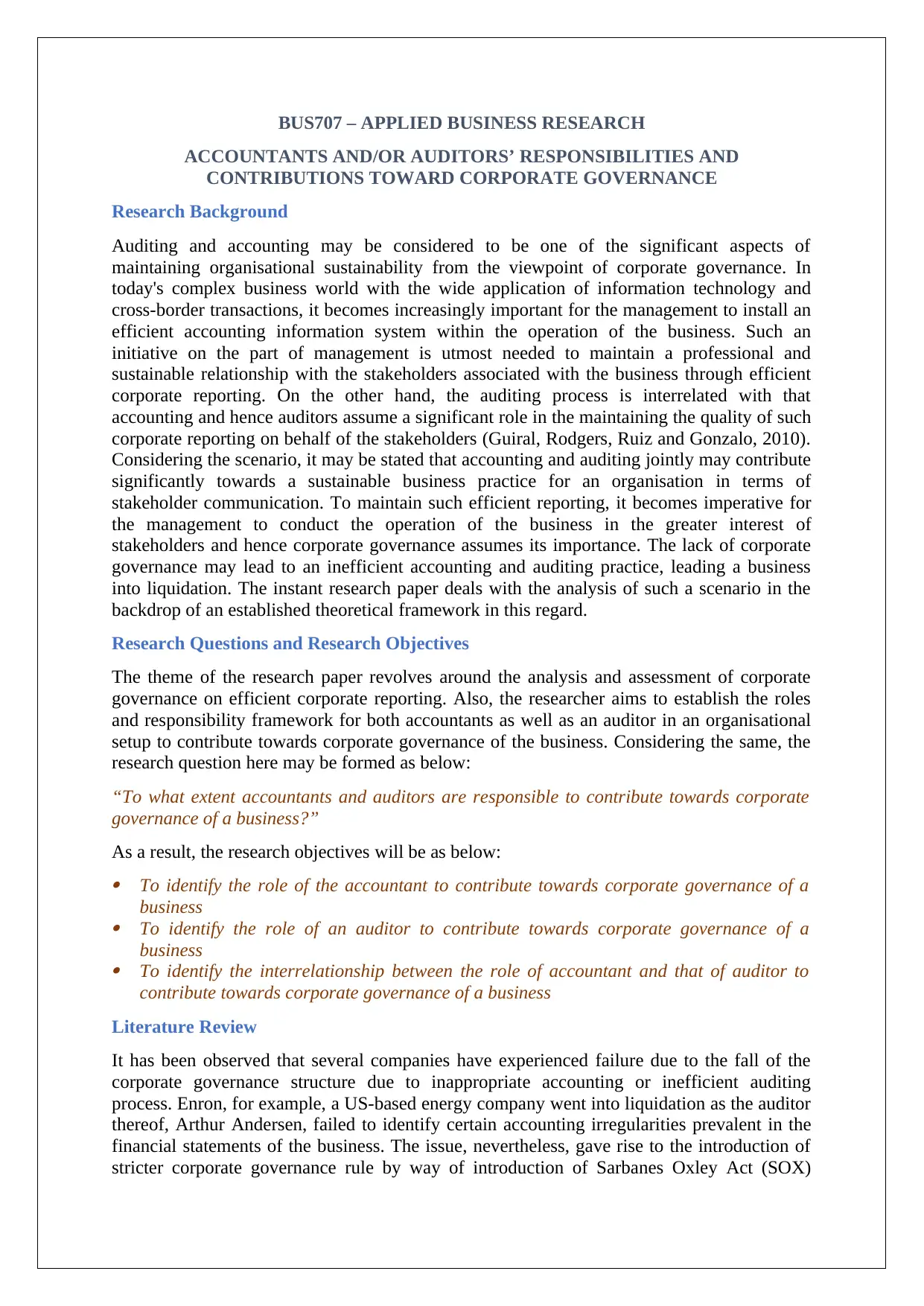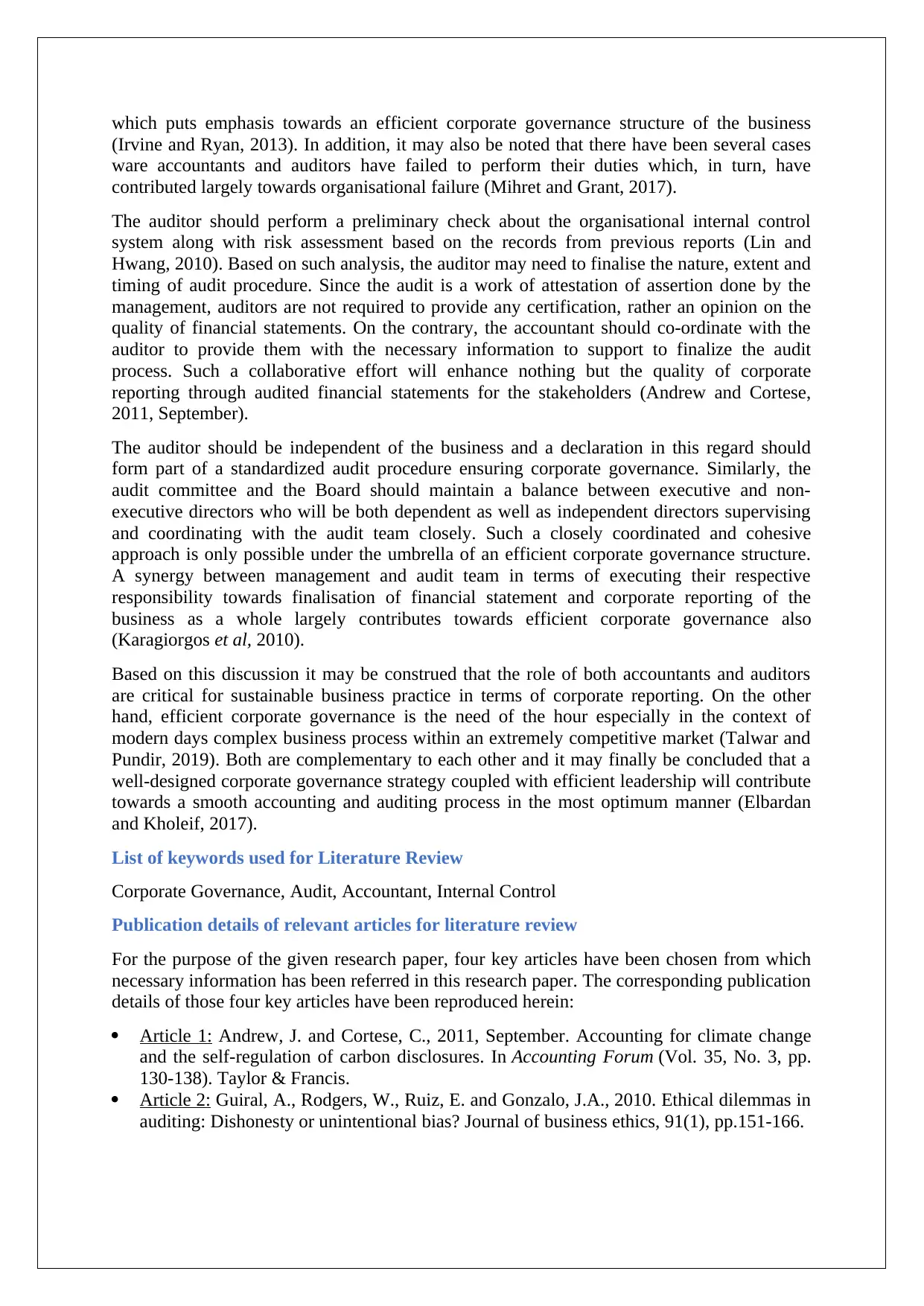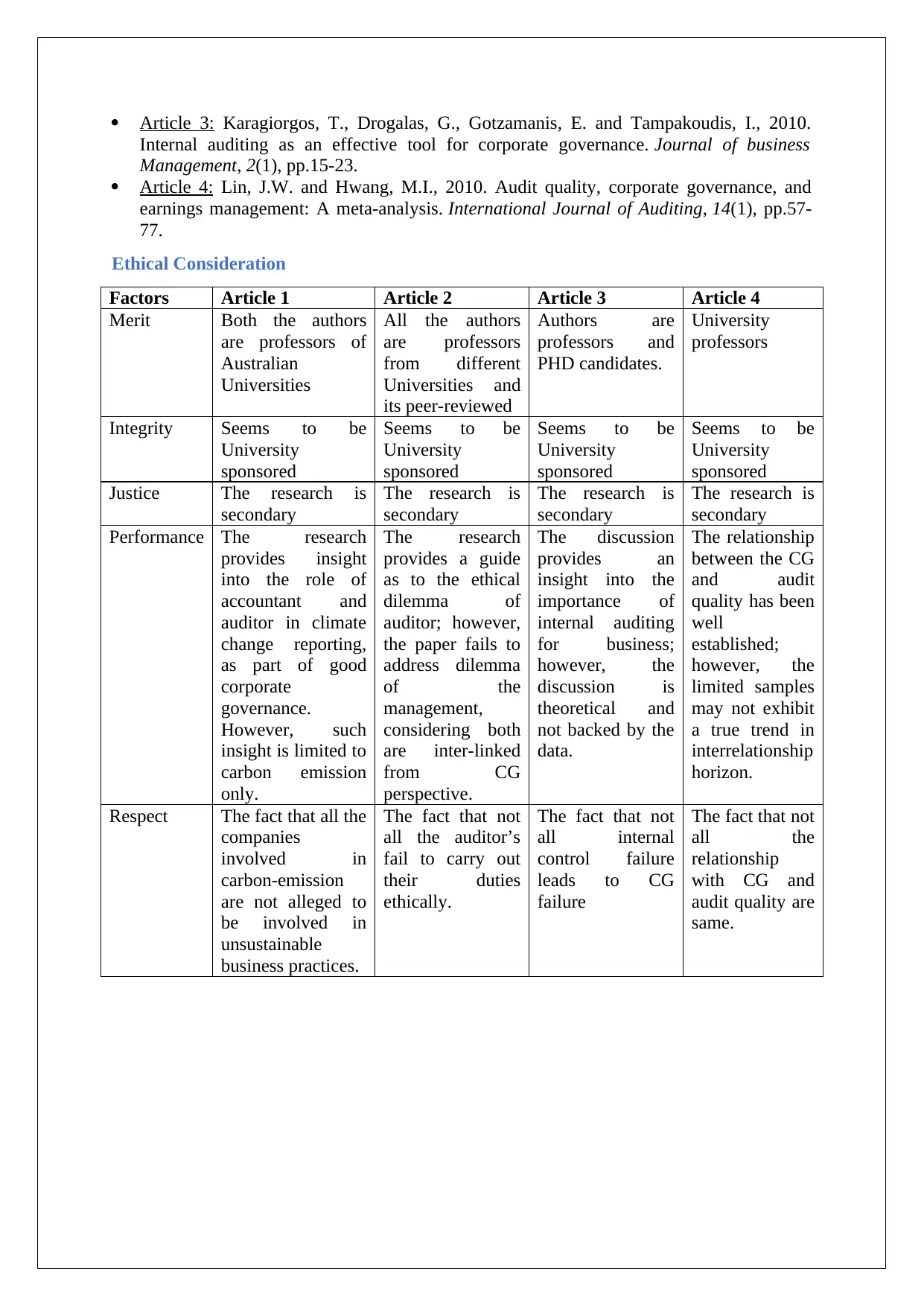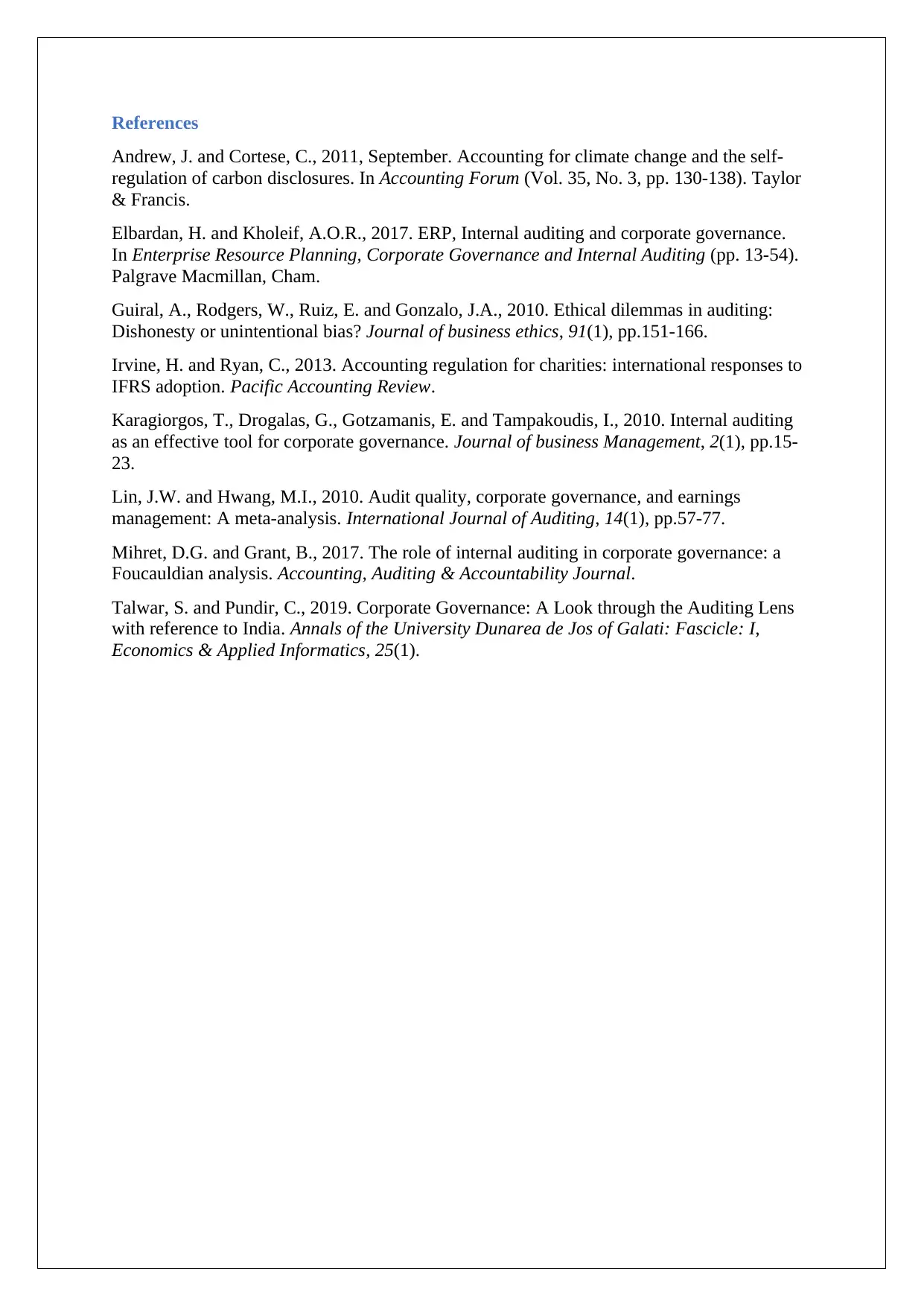BUS707 - Accountants and Auditors Responsibilities in Governance
VerifiedAdded on 2022/09/26
|4
|1755
|21
Report
AI Summary
This research paper investigates the responsibilities and contributions of accountants and auditors towards corporate governance, focusing on their roles in ensuring efficient corporate reporting and sustainable business practices. It addresses the research question of how accountants and auditors contribute to corporate governance by identifying their individual roles and the interrelationship between them. The literature review highlights instances where failures in accounting and auditing have led to corporate collapses, emphasizing the importance of a strong corporate governance structure. The paper also discusses the ethical considerations involved in accounting and auditing, referencing key articles and their publication details. Ultimately, the report underscores the critical role of both accountants and auditors, along with effective leadership, in fostering a smooth accounting and auditing process within a well-designed corporate governance strategy.

BUS707 – APPLIED BUSINESS RESEARCH
ACCOUNTANTS AND/OR AUDITORS’ RESPONSIBILITIES AND
CONTRIBUTIONS TOWARD CORPORATE GOVERNANCE
Research Background
Auditing and accounting may be considered to be one of the significant aspects of
maintaining organisational sustainability from the viewpoint of corporate governance. In
today's complex business world with the wide application of information technology and
cross-border transactions, it becomes increasingly important for the management to install an
efficient accounting information system within the operation of the business. Such an
initiative on the part of management is utmost needed to maintain a professional and
sustainable relationship with the stakeholders associated with the business through efficient
corporate reporting. On the other hand, the auditing process is interrelated with that
accounting and hence auditors assume a significant role in the maintaining the quality of such
corporate reporting on behalf of the stakeholders (Guiral, Rodgers, Ruiz and Gonzalo, 2010).
Considering the scenario, it may be stated that accounting and auditing jointly may contribute
significantly towards a sustainable business practice for an organisation in terms of
stakeholder communication. To maintain such efficient reporting, it becomes imperative for
the management to conduct the operation of the business in the greater interest of
stakeholders and hence corporate governance assumes its importance. The lack of corporate
governance may lead to an inefficient accounting and auditing practice, leading a business
into liquidation. The instant research paper deals with the analysis of such a scenario in the
backdrop of an established theoretical framework in this regard.
Research Questions and Research Objectives
The theme of the research paper revolves around the analysis and assessment of corporate
governance on efficient corporate reporting. Also, the researcher aims to establish the roles
and responsibility framework for both accountants as well as an auditor in an organisational
setup to contribute towards corporate governance of the business. Considering the same, the
research question here may be formed as below:
“To what extent accountants and auditors are responsible to contribute towards corporate
governance of a business?”
As a result, the research objectives will be as below: To identify the role of the accountant to contribute towards corporate governance of a
business To identify the role of an auditor to contribute towards corporate governance of a
business To identify the interrelationship between the role of accountant and that of auditor to
contribute towards corporate governance of a business
Literature Review
It has been observed that several companies have experienced failure due to the fall of the
corporate governance structure due to inappropriate accounting or inefficient auditing
process. Enron, for example, a US-based energy company went into liquidation as the auditor
thereof, Arthur Andersen, failed to identify certain accounting irregularities prevalent in the
financial statements of the business. The issue, nevertheless, gave rise to the introduction of
stricter corporate governance rule by way of introduction of Sarbanes Oxley Act (SOX)
ACCOUNTANTS AND/OR AUDITORS’ RESPONSIBILITIES AND
CONTRIBUTIONS TOWARD CORPORATE GOVERNANCE
Research Background
Auditing and accounting may be considered to be one of the significant aspects of
maintaining organisational sustainability from the viewpoint of corporate governance. In
today's complex business world with the wide application of information technology and
cross-border transactions, it becomes increasingly important for the management to install an
efficient accounting information system within the operation of the business. Such an
initiative on the part of management is utmost needed to maintain a professional and
sustainable relationship with the stakeholders associated with the business through efficient
corporate reporting. On the other hand, the auditing process is interrelated with that
accounting and hence auditors assume a significant role in the maintaining the quality of such
corporate reporting on behalf of the stakeholders (Guiral, Rodgers, Ruiz and Gonzalo, 2010).
Considering the scenario, it may be stated that accounting and auditing jointly may contribute
significantly towards a sustainable business practice for an organisation in terms of
stakeholder communication. To maintain such efficient reporting, it becomes imperative for
the management to conduct the operation of the business in the greater interest of
stakeholders and hence corporate governance assumes its importance. The lack of corporate
governance may lead to an inefficient accounting and auditing practice, leading a business
into liquidation. The instant research paper deals with the analysis of such a scenario in the
backdrop of an established theoretical framework in this regard.
Research Questions and Research Objectives
The theme of the research paper revolves around the analysis and assessment of corporate
governance on efficient corporate reporting. Also, the researcher aims to establish the roles
and responsibility framework for both accountants as well as an auditor in an organisational
setup to contribute towards corporate governance of the business. Considering the same, the
research question here may be formed as below:
“To what extent accountants and auditors are responsible to contribute towards corporate
governance of a business?”
As a result, the research objectives will be as below: To identify the role of the accountant to contribute towards corporate governance of a
business To identify the role of an auditor to contribute towards corporate governance of a
business To identify the interrelationship between the role of accountant and that of auditor to
contribute towards corporate governance of a business
Literature Review
It has been observed that several companies have experienced failure due to the fall of the
corporate governance structure due to inappropriate accounting or inefficient auditing
process. Enron, for example, a US-based energy company went into liquidation as the auditor
thereof, Arthur Andersen, failed to identify certain accounting irregularities prevalent in the
financial statements of the business. The issue, nevertheless, gave rise to the introduction of
stricter corporate governance rule by way of introduction of Sarbanes Oxley Act (SOX)
Paraphrase This Document
Need a fresh take? Get an instant paraphrase of this document with our AI Paraphraser

which puts emphasis towards an efficient corporate governance structure of the business
(Irvine and Ryan, 2013). In addition, it may also be noted that there have been several cases
ware accountants and auditors have failed to perform their duties which, in turn, have
contributed largely towards organisational failure (Mihret and Grant, 2017).
The auditor should perform a preliminary check about the organisational internal control
system along with risk assessment based on the records from previous reports (Lin and
Hwang, 2010). Based on such analysis, the auditor may need to finalise the nature, extent and
timing of audit procedure. Since the audit is a work of attestation of assertion done by the
management, auditors are not required to provide any certification, rather an opinion on the
quality of financial statements. On the contrary, the accountant should co-ordinate with the
auditor to provide them with the necessary information to support to finalize the audit
process. Such a collaborative effort will enhance nothing but the quality of corporate
reporting through audited financial statements for the stakeholders (Andrew and Cortese,
2011, September).
The auditor should be independent of the business and a declaration in this regard should
form part of a standardized audit procedure ensuring corporate governance. Similarly, the
audit committee and the Board should maintain a balance between executive and non-
executive directors who will be both dependent as well as independent directors supervising
and coordinating with the audit team closely. Such a closely coordinated and cohesive
approach is only possible under the umbrella of an efficient corporate governance structure.
A synergy between management and audit team in terms of executing their respective
responsibility towards finalisation of financial statement and corporate reporting of the
business as a whole largely contributes towards efficient corporate governance also
(Karagiorgos et al, 2010).
Based on this discussion it may be construed that the role of both accountants and auditors
are critical for sustainable business practice in terms of corporate reporting. On the other
hand, efficient corporate governance is the need of the hour especially in the context of
modern days complex business process within an extremely competitive market (Talwar and
Pundir, 2019). Both are complementary to each other and it may finally be concluded that a
well-designed corporate governance strategy coupled with efficient leadership will contribute
towards a smooth accounting and auditing process in the most optimum manner (Elbardan
and Kholeif, 2017).
List of keywords used for Literature Review
Corporate Governance, Audit, Accountant, Internal Control
Publication details of relevant articles for literature review
For the purpose of the given research paper, four key articles have been chosen from which
necessary information has been referred in this research paper. The corresponding publication
details of those four key articles have been reproduced herein:
Article 1: Andrew, J. and Cortese, C., 2011, September. Accounting for climate change
and the self-regulation of carbon disclosures. In Accounting Forum (Vol. 35, No. 3, pp.
130-138). Taylor & Francis.
Article 2: Guiral, A., Rodgers, W., Ruiz, E. and Gonzalo, J.A., 2010. Ethical dilemmas in
auditing: Dishonesty or unintentional bias? Journal of business ethics, 91(1), pp.151-166.
(Irvine and Ryan, 2013). In addition, it may also be noted that there have been several cases
ware accountants and auditors have failed to perform their duties which, in turn, have
contributed largely towards organisational failure (Mihret and Grant, 2017).
The auditor should perform a preliminary check about the organisational internal control
system along with risk assessment based on the records from previous reports (Lin and
Hwang, 2010). Based on such analysis, the auditor may need to finalise the nature, extent and
timing of audit procedure. Since the audit is a work of attestation of assertion done by the
management, auditors are not required to provide any certification, rather an opinion on the
quality of financial statements. On the contrary, the accountant should co-ordinate with the
auditor to provide them with the necessary information to support to finalize the audit
process. Such a collaborative effort will enhance nothing but the quality of corporate
reporting through audited financial statements for the stakeholders (Andrew and Cortese,
2011, September).
The auditor should be independent of the business and a declaration in this regard should
form part of a standardized audit procedure ensuring corporate governance. Similarly, the
audit committee and the Board should maintain a balance between executive and non-
executive directors who will be both dependent as well as independent directors supervising
and coordinating with the audit team closely. Such a closely coordinated and cohesive
approach is only possible under the umbrella of an efficient corporate governance structure.
A synergy between management and audit team in terms of executing their respective
responsibility towards finalisation of financial statement and corporate reporting of the
business as a whole largely contributes towards efficient corporate governance also
(Karagiorgos et al, 2010).
Based on this discussion it may be construed that the role of both accountants and auditors
are critical for sustainable business practice in terms of corporate reporting. On the other
hand, efficient corporate governance is the need of the hour especially in the context of
modern days complex business process within an extremely competitive market (Talwar and
Pundir, 2019). Both are complementary to each other and it may finally be concluded that a
well-designed corporate governance strategy coupled with efficient leadership will contribute
towards a smooth accounting and auditing process in the most optimum manner (Elbardan
and Kholeif, 2017).
List of keywords used for Literature Review
Corporate Governance, Audit, Accountant, Internal Control
Publication details of relevant articles for literature review
For the purpose of the given research paper, four key articles have been chosen from which
necessary information has been referred in this research paper. The corresponding publication
details of those four key articles have been reproduced herein:
Article 1: Andrew, J. and Cortese, C., 2011, September. Accounting for climate change
and the self-regulation of carbon disclosures. In Accounting Forum (Vol. 35, No. 3, pp.
130-138). Taylor & Francis.
Article 2: Guiral, A., Rodgers, W., Ruiz, E. and Gonzalo, J.A., 2010. Ethical dilemmas in
auditing: Dishonesty or unintentional bias? Journal of business ethics, 91(1), pp.151-166.

Article 3: Karagiorgos, T., Drogalas, G., Gotzamanis, E. and Tampakoudis, I., 2010.
Internal auditing as an effective tool for corporate governance. Journal of business
Management, 2(1), pp.15-23.
Article 4: Lin, J.W. and Hwang, M.I., 2010. Audit quality, corporate governance, and
earnings management: A meta‐analysis. International Journal of Auditing, 14(1), pp.57-
77.
Ethical Consideration
Factors Article 1 Article 2 Article 3 Article 4
Merit Both the authors
are professors of
Australian
Universities
All the authors
are professors
from different
Universities and
its peer-reviewed
Authors are
professors and
PHD candidates.
University
professors
Integrity Seems to be
University
sponsored
Seems to be
University
sponsored
Seems to be
University
sponsored
Seems to be
University
sponsored
Justice The research is
secondary
The research is
secondary
The research is
secondary
The research is
secondary
Performance The research
provides insight
into the role of
accountant and
auditor in climate
change reporting,
as part of good
corporate
governance.
However, such
insight is limited to
carbon emission
only.
The research
provides a guide
as to the ethical
dilemma of
auditor; however,
the paper fails to
address dilemma
of the
management,
considering both
are inter-linked
from CG
perspective.
The discussion
provides an
insight into the
importance of
internal auditing
for business;
however, the
discussion is
theoretical and
not backed by the
data.
The relationship
between the CG
and audit
quality has been
well
established;
however, the
limited samples
may not exhibit
a true trend in
interrelationship
horizon.
Respect The fact that all the
companies
involved in
carbon-emission
are not alleged to
be involved in
unsustainable
business practices.
The fact that not
all the auditor’s
fail to carry out
their duties
ethically.
The fact that not
all internal
control failure
leads to CG
failure
The fact that not
all the
relationship
with CG and
audit quality are
same.
Internal auditing as an effective tool for corporate governance. Journal of business
Management, 2(1), pp.15-23.
Article 4: Lin, J.W. and Hwang, M.I., 2010. Audit quality, corporate governance, and
earnings management: A meta‐analysis. International Journal of Auditing, 14(1), pp.57-
77.
Ethical Consideration
Factors Article 1 Article 2 Article 3 Article 4
Merit Both the authors
are professors of
Australian
Universities
All the authors
are professors
from different
Universities and
its peer-reviewed
Authors are
professors and
PHD candidates.
University
professors
Integrity Seems to be
University
sponsored
Seems to be
University
sponsored
Seems to be
University
sponsored
Seems to be
University
sponsored
Justice The research is
secondary
The research is
secondary
The research is
secondary
The research is
secondary
Performance The research
provides insight
into the role of
accountant and
auditor in climate
change reporting,
as part of good
corporate
governance.
However, such
insight is limited to
carbon emission
only.
The research
provides a guide
as to the ethical
dilemma of
auditor; however,
the paper fails to
address dilemma
of the
management,
considering both
are inter-linked
from CG
perspective.
The discussion
provides an
insight into the
importance of
internal auditing
for business;
however, the
discussion is
theoretical and
not backed by the
data.
The relationship
between the CG
and audit
quality has been
well
established;
however, the
limited samples
may not exhibit
a true trend in
interrelationship
horizon.
Respect The fact that all the
companies
involved in
carbon-emission
are not alleged to
be involved in
unsustainable
business practices.
The fact that not
all the auditor’s
fail to carry out
their duties
ethically.
The fact that not
all internal
control failure
leads to CG
failure
The fact that not
all the
relationship
with CG and
audit quality are
same.
⊘ This is a preview!⊘
Do you want full access?
Subscribe today to unlock all pages.

Trusted by 1+ million students worldwide

References
Andrew, J. and Cortese, C., 2011, September. Accounting for climate change and the self-
regulation of carbon disclosures. In Accounting Forum (Vol. 35, No. 3, pp. 130-138). Taylor
& Francis.
Elbardan, H. and Kholeif, A.O.R., 2017. ERP, Internal auditing and corporate governance.
In Enterprise Resource Planning, Corporate Governance and Internal Auditing (pp. 13-54).
Palgrave Macmillan, Cham.
Guiral, A., Rodgers, W., Ruiz, E. and Gonzalo, J.A., 2010. Ethical dilemmas in auditing:
Dishonesty or unintentional bias? Journal of business ethics, 91(1), pp.151-166.
Irvine, H. and Ryan, C., 2013. Accounting regulation for charities: international responses to
IFRS adoption. Pacific Accounting Review.
Karagiorgos, T., Drogalas, G., Gotzamanis, E. and Tampakoudis, I., 2010. Internal auditing
as an effective tool for corporate governance. Journal of business Management, 2(1), pp.15-
23.
Lin, J.W. and Hwang, M.I., 2010. Audit quality, corporate governance, and earnings
management: A meta‐analysis. International Journal of Auditing, 14(1), pp.57-77.
Mihret, D.G. and Grant, B., 2017. The role of internal auditing in corporate governance: a
Foucauldian analysis. Accounting, Auditing & Accountability Journal.
Talwar, S. and Pundir, C., 2019. Corporate Governance: A Look through the Auditing Lens
with reference to India. Annals of the University Dunarea de Jos of Galati: Fascicle: I,
Economics & Applied Informatics, 25(1).
Andrew, J. and Cortese, C., 2011, September. Accounting for climate change and the self-
regulation of carbon disclosures. In Accounting Forum (Vol. 35, No. 3, pp. 130-138). Taylor
& Francis.
Elbardan, H. and Kholeif, A.O.R., 2017. ERP, Internal auditing and corporate governance.
In Enterprise Resource Planning, Corporate Governance and Internal Auditing (pp. 13-54).
Palgrave Macmillan, Cham.
Guiral, A., Rodgers, W., Ruiz, E. and Gonzalo, J.A., 2010. Ethical dilemmas in auditing:
Dishonesty or unintentional bias? Journal of business ethics, 91(1), pp.151-166.
Irvine, H. and Ryan, C., 2013. Accounting regulation for charities: international responses to
IFRS adoption. Pacific Accounting Review.
Karagiorgos, T., Drogalas, G., Gotzamanis, E. and Tampakoudis, I., 2010. Internal auditing
as an effective tool for corporate governance. Journal of business Management, 2(1), pp.15-
23.
Lin, J.W. and Hwang, M.I., 2010. Audit quality, corporate governance, and earnings
management: A meta‐analysis. International Journal of Auditing, 14(1), pp.57-77.
Mihret, D.G. and Grant, B., 2017. The role of internal auditing in corporate governance: a
Foucauldian analysis. Accounting, Auditing & Accountability Journal.
Talwar, S. and Pundir, C., 2019. Corporate Governance: A Look through the Auditing Lens
with reference to India. Annals of the University Dunarea de Jos of Galati: Fascicle: I,
Economics & Applied Informatics, 25(1).
1 out of 4
Related Documents
Your All-in-One AI-Powered Toolkit for Academic Success.
+13062052269
info@desklib.com
Available 24*7 on WhatsApp / Email
![[object Object]](/_next/static/media/star-bottom.7253800d.svg)
Unlock your academic potential
Copyright © 2020–2026 A2Z Services. All Rights Reserved. Developed and managed by ZUCOL.





